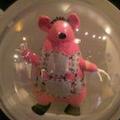Sounding well-read So. You are in that all-important oral examination, job interview or (possibly even) first date. You have just told the story about the time when you got drunk and fell asleep on an aeroplane and when you woke up you couldn't remember what country you were in or why**. Suddenly you are gripped by doubt. Have you made yourself sound stupid, shallow or mentally unstable? Do you imagine a look of agitation on the face of your examiner / interviewer / hot date? Don't panic! You can make yourself sound smart and well-read at any time, by the use of a quotation.
When I was little nearly every family owned a Bible. Not for reading you understand. Most people in England would rather clear out their garage than read the Bible. No, it was there as a source book for impressive-sounding quotes. You were guaranteed an extra couple of marks in any essay, on any subject, if you threw in a quote from the Bible or Shakespeare. My brother's party trick was to dispute the existence of God using quotations from the Bible (he must have gone to some really dull parties). Nowadays you no longer need to own books to quote from them. If you are speaking in English, go to http://www.famousquotesandauthors.com/, pick six impressive-sounding quotes and memorise them. I can virtually guarantee that at some point in your conversation the opportunity will arise to say one of them. It may not actually be relevant to what is being discussed, but it will be grammatically correct English and win you a few seconds of thinking time (see "Getting a moment to think"). If you want to sound cool and witty rather than well-read and deep, try this site: http://www.great-quotes.com/. You can learn some quotes from Frank Zappa (ask your parents who this is) or Nelson Mandela. If you want to sound educated and witty in a different language, translate "famous quotes" into your target language and Google it. Or you can ask your tutor for some of their favourite quotes and who said them.
Poetry (if you can remember any) and song lyrics can be used too. Pretty much any line from any Bob Dylan song sounds profound if you say it seriously enough. You can search on his song lyrics on this site:http://www.bobdylan.com/#/songs. Or any folk singer you like: all folk song lyrics sound like they mean more than they actually do.
An expert at the quotations game will have a quote to hand for every essay question they are likely to encounter. Favourite language examination topics include: isn't society in a shocking state, the planet's a bit dirty, politicians are evil, war is nasty. It doesn't take long to choose a profound quote for each of these topics. If you aim to end your essay with a preprepared quote the the essay is much easier to write. For example: Question: "Isn't War nasty?" Answer: "Bloody human history .......the suffering of innocent children.....waste of scarce resources....large-scale atrocities....power-grabbing politics.......slaughter...human greed...not in my name.... "To conclude with the words of Antoine de Saint-Exupery: "War is not an adventure. It is a disease." I think I could write 500 words on that even if I was half asleep. Come to think of it, I probably HAVE written it while half asleep at some point in school. Being profound doesn't actually take a lot of thought. I'll let Albert Einstein sum it up for us: "Imagination is more important than knowledge." **** ------------------- ** Yes, I have done this. And told the story in an inappropriate situation afterwards.
**** Tchja! I'd have written this article much quicker if I'd thought of that quote before I started writing it!

